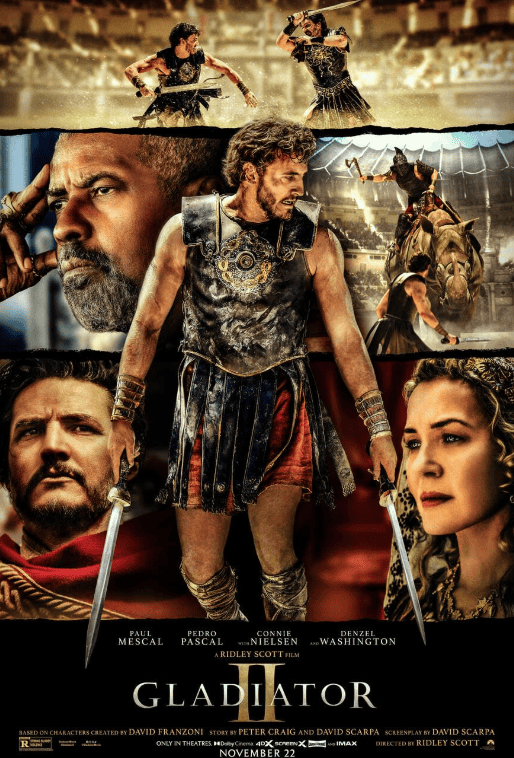By Jeff Igbokwe
Following the critical acclaim of the prequel 24 years earlier, Ridley Scott’s Gladiator II arrived in theatres on November 15th with high expectations. Set around 15 years after Maximus’ sacrifice in the original, this sequel portrays Ancient Rome as this corrupt and crumbling empire. It’s the type of movie where you feel reluctant to trust a new character at first after they are first introduced onscreen. With intense and bloody fight scenes sandwiched in between breathtaking shots of Ancient Roman citadels, and landscapes, Scott ensures that his movie doesn’t fall short in the way of action and awe. As a result, the film is a visually impressive spectacle, unfortunately, what the movie makes up for in eye candy, it lacks narrative. When I see a sequel like this, I can’t help but group it with films such as Hangover Part 2, The Force Awakens and the Home Alone movies. Once you have seen the original, you have seen the sequel, and Gladiator II seemingly bears so much in common with its predecessor that it seems more like a remake than a direct follow-up. Despite this, the movie can provide enough thrill to amuse general fans of action-packed films.
Lucius Verus (Paul Mescal) is the focus of this story. The son of Maximus (Russell Crowe) from the prequel, is driven by vengeance after his home kingdom of Numidia is sieged and conquered by the Roman general Marcus Acacius (Pedro Pascal) and his army. These events lead to the enslavement of Lucius and his people, and their forced combat in the Colosseum. After this, Lucius’ goal becomes clear: He sets out to challenge the twin emperors, Caracalla (Joseph Quinn) and Geta (Fred Hechinger) sadistic rule, and restore hope to Rome.
Mescal’s overall portrayal of Lucius is one of the film’s positives. He is able to combine raw physical strength with emotional depth, capturing the duality of a man who finds himself torn between his duties and anguish. His character resembles Crowe’s Maximus, and as they are father and son, this is understandable. In their stories, both men are courageous warriors who, despite their skills in the Colosseum, deep down are simple men.
While Mescal is good in the role, and parallels between a father and son character are not farfetched, the uncanny resemblance of their characters may spark conversation about how similar the sequel is to its predecessor. Their arcs seamlessly mirror each other as both men lose a loved one, and become enslaved by the Romans which leads them to use their lust for revenge as fuel when engaging in gladiatorial combat. The two even share a ‘Finishing Move’ move as they duel-wield swords to decapitate the opponent. If you are familiar with the first Gladiator, you may recall the film opening with Maximus running his hand through a field of crops. In the sequel, it is Lucius who lets seeds run through his fingertips. It’s moments like these which would make a viewer ask the question, “Is Gladiator II an actual sequel”. On the surface, it may seem like a modern remake of a classic movie, with more CGI and two insane emperors this time.
Denzel Washington’s performance as the ex-slave turned gladiator owner Macrinus adds a layer of intrigue to the movie. Macrinus seems to act as a sort of mentor figure to Lucius early in the film, however, we later learn that his intentions are purely to help himself become emperor. Washington’s daunting presence for drama paired with the flamboyance of his character adds extra depth to the movie as it’s undeniable that whenever he’s on screen, he steals the show.
It is obvious that Scott wanted to make the movie a spectacle, and visually, Gladiator II is breathtaking. Scott’s mastery of large-scale filmmaking is apparent in most scenes, from the towering shots of the Colosseum to the stunning costumes. The battle sequences are showstoppers, featuring gladiatorial duels against CGI baboons, a rhino and a naumachia (a staged naval battle for entertainment) with shark-infested waters in the Colosseum. Despite the impressive visuals, at times the movie’s narrative feels ‘watered down’, leaving certain moments feeling underdeveloped and pushed to the side to make way for the visuals. A good example of this is the backstory of emperors Geta and Caracalla. Quinn and Hechinger do portray these characters amazingly on screen, however, there is a lack of explanation on how they rose to power after the events of the prequel, and their characters seem to rely more on exaggeration rather than significant narrative stakes. The absence of context for these characters creates a hole when trying to understand the widescale political chaos that the film attempts to portray.
Pascal’s Marcus Acacius suffers from a similar issue. While the character is hyped up to be this menacing presence, especially during the opening act, the general doesn’t receive enough screen time or backstory to make his antagonism seem like a realistic threat. His role as both commander of the Roman army and a rival to Lucius seems shallow, leaving the film without a threatening antagonist with the layered complexity that Joaquin Phoenix’s Commodus brought to Scott’s original.
Despite the movie’s issues, Gladiator II does manage to entertain and would be a good watch for general audiences looking for a new action-packed release. While die-hard fans of the original may be slightly disappointed, the strong performances of actors like Denzel, and Ridley Scott’s talent to create a visually stunning cinematic experience are enough to recommend you go and watch. Just don’t expect a timeless classic like the original.


